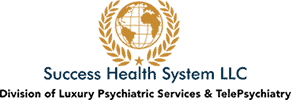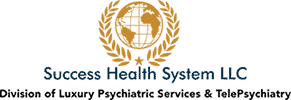ADHD Doctor in Creve Coeur, MO
ADHD is a neurodevelopmental disorder characterized by persistent patterns of inattention, hyperactivity, and impulsivity that can significantly impact an individual’s daily functioning. Some common symptoms of ADHD include fidgeting, forgetfulness, restlessness, trouble focusing, and impulsive decision-making. Board-Certified Psychiatrist Dr. Moses Tabe Ambilichu M.D. at Success Health System is here to help you. For more information, contact us today or schedule an appointment online. We are conveniently located at 12401 Olive Boulevard, Suite 206, Creve Coeur, MO 63141.
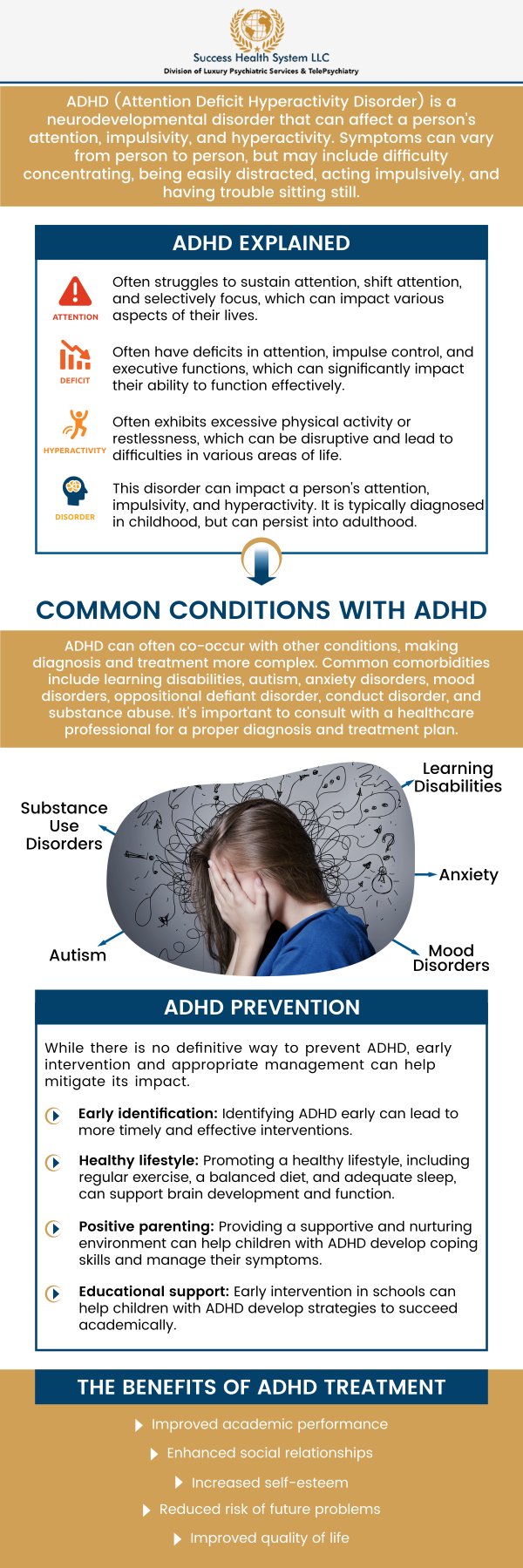
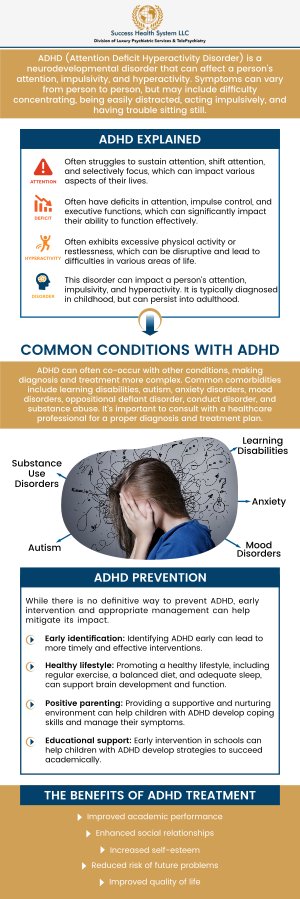
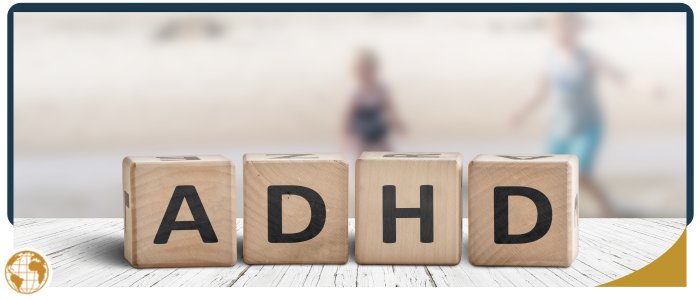
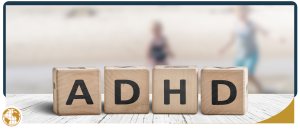
Table of Contents:
What is Attention-Deficit Hyperactivity Disorder (ADHD)?
What are the signs and symptoms of ADHD?
What is the difference between ADD and ADHD?
When should you see a therapist for ADHD?
We’ve all done it – daydreamed in class, fidgeted at the dinner table, did something without thinking, and forgot our homework. But these things, however normal and mundane, can also be signs of one of the most common childhood neurodevelopmental disorders – Attention-deficit/hyperactivity disorder or ADHD. It is also sometimes referred to as ADD or attention-deficit disorder, but this is outdated, and ADHD is now the term officially used.
Attention-Deficit Hyperactivity Disorder (ADHD) is a neurodevelopmental condition characterized by symptoms of inattention, hyperactivity, and impulsivity. These symptoms can vary in severity and often interfere with daily functioning at school, work, or home. Individuals with ADHD may struggle to stay focused, follow through on tasks, and organize their activities. They may also display impulsive behaviors, such as making decisions without considering consequences, and experience restlessness or difficulty staying still.
ADHD is commonly diagnosed in childhood, but symptoms can continue into adulthood. While the exact cause is unknown, a combination of genetic, environmental, and neurological factors is believed to contribute. Treatment typically includes behavioral therapy, lifestyle changes, and, in some cases, medication to help manage symptoms. Early diagnosis and intervention are key to improving the quality of life for those with ADHD, allowing individuals to develop strategies to cope with their challenges and lead successful lives.
Many people experience periods of inattention, trouble focusing, and impulsiveness. Still, for those with ADHD, these behaviors are more frequent and more severe, and affect the way they function at school, work, or in social situations. The main components of attention-deficit/hyperactivity disorder are inattention, hyperactivity, and impulsivity. Some people with ADHD show more signs of inattention, others more hyperactivity-impulsivity, and others exhibit both.
People with symptoms of inattention may often:
• Make careless mistakes at school, work, or during other activities
• Be unable to pay attention during conversations, schoolwork, lectures, or lengthy reading
• Find it hard to follow instructions and get easily sidetracked
• Have difficulty doing things in order, organizing tasks or activities, and meeting deadlines
• Have difficulty with time management
• Avoid tasks that require a certain level of mental effort, such as homework, or preparing reports
• Misplace everyday things such as school supplies, wallets, keys, paperwork, or cell phones
• Be easily distracted
• Be forgetful in daily activities
People with symptoms of hyperactivity-impulsivity may often:
• Fidget and squirm
• Leave their seats when they’re expected to be seated
• Run around or climb at inappropriate times or feel restless
• Be unable to do tasks or hobbies quietly
• Be always on the go
• Talk excessively
• Answer questions before they’ve been fully asked, finish other people’s sentences, or talk over people in conversations
• Have difficulty waiting their turn
As mentioned above, the term ADD is no longer used following the American Psychiatric Society’s revision of the criteria used in the diagnosis of ADHD. However, ADD is still sometimes used interchangeably with ADHD and most people understand that the two are essentially the same. ADD, or attention-deficit disorder was previously used to describe people (usually children but adults can also be diagnosed) who have problems in paying attention but are not hyperactive. ADD has been replaced by the type of ADHD called “predominantly inattentive”. The term ADHD became official in May 2013 when the American Psychiatric Association released the “Diagnostic and Statistical Manual of Mental Disorders, 5th Edition (DSM-5)”, which changed the criteria used to diagnose ADHD.
If you see your child, or other loved one, regularly displaying any of the symptoms commonly associated with attention-deficit/hyperactivity disorder, especially if they’re affecting success at school or work, or in their relationships, it is advisable to seek professional help of a therapist. With children, teachers and other professionals can often see the signs sooner and more clearly as they are with the child in situations that necessitate attention and focus; they should share their observations with the parent(s) who can then decide the best course of action.
If you or a loved one are seeking help or want more information on mental health disorders or therapy, contact us or schedule an appointment online with Success Health System. We are conveniently located at 12401 Olive Boulevard, Suite 206, Creve Coeur, MO 63141. We serve patients from Creve Coeur MO, Overland MO, Bridgeton MO, Clayton MO, Kirkwood MO, Chesterfield MO, Clarkson Valley MO and surrounding areas.

Check Out Our 5 Star Reviews


Additional Services You May Be Interested In
▸Addiction Treatment
▸ADHD Treatment
▸Anxiety Treatment
▸Bipolar Disorder
▸Depressive Disorders
▸Mental Disorder
▸Obsessive Compulsive Disorders
▸Psychotic Disorders
▸PTSD Treatment
▸Phobias and Fears Therapist
▸Psychiatrist
▸Substance Disorder
▸Social Anxiety Psychiatrist
▸Medication Management
▸Psychotherapy
▸Exomind TMS – Columbia
▸Spravato – Independence

Additional Services You May Be Interested In
▸Addiction Treatment
▸ADHD Treatment
▸Anxiety Treatment
▸Bipolar Disorder
▸Depressive Disorders
▸Mental Disorder
▸Obsessive Compulsive Disorders
▸Psychotic Disorders
▸PTSD Treatment
▸Phobias and Fears Therapist
▸Psychiatrist
▸Substance Disorder
▸Social Anxiety Psychiatrist
▸Medication Management
▸Psychotherapy
▸Exomind TMS – Columbia
▸Spravato – Independence
